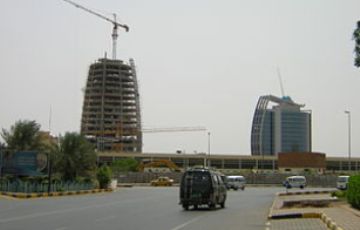Businessmen union warns of “catastrophe” ahead of Sudan’s economy
June 3, 2012 (KHARTOUM) – The Union of Sudanese Businessmen (USB) has urged the authorities to seek out alternative austerity measures as opposed to their “catastrophic” intention of lifting fuel subsidies, warning that the move will put the government at risk.
 Last week the ruling National Congress Party (NCP) approved plans to suspend state subsidization of fuel products despite objections raised by the party’s parliamentarians who later conditioned their consent on a set of demands including the sacking of Finance Minister Ali Mahmoud, citing his responsibility for wrong economic policies.
Last week the ruling National Congress Party (NCP) approved plans to suspend state subsidization of fuel products despite objections raised by the party’s parliamentarians who later conditioned their consent on a set of demands including the sacking of Finance Minister Ali Mahmoud, citing his responsibility for wrong economic policies.
The plan to lift fuel subsidies was recommended by the party’s economy officials in an attempt to save the country’s economy which has been deteriorating since it lost 75 percent of its oil revenues with South Sudan’s secession in July last year.
In a meeting held Sunday with Al-Zubair Ahmad Al-Hassan, the head of the financial and economic affairs committee at the Sudanese parliament, USB representatives described the decision to lift fuel subsidies as “catastrophic” and warned that it would put the government “in the eye of the storm.”
USB representatives also blamed the government’s economic and financial policies for plunging the country into the current economic crisis.
Amin Al-Nifidi, a prominent USB member, said that the impending measure of lifting fuel subsidies was decided without careful studies and involvement of others.
A member of the USB’s agriculture sector, Sayid Ahmad Abbas, said that government policies had inconvenienced many farmers. He also called on the authorities to reduce perquisites of official post-holders.
For his part, Al-Zubair pointed out that the economy was “in travail” and demanded that the state applies austerity measures “on itself first.” He went on to warn that any frivolous spending would result in more inflation.
Annual inflation in Sudan is close to 30 per cent and the local currency has been depreciating despite multiple interventions and devaluation by the country’s central bank.
Meanwhile, an MP named Ali Abarsi has faulted the decision to lift fuel subsidies on the grounds that it would hurt the government before anyone else.
“Whatever the government’s justifications for lifting fuel subsidies, it will be the most affected since it is the biggest consumer of fuel” he told reporters on Sunday.
Abarsi, who represents the NCP, also predicted that the price of dollars would jump to the equivalent of 12 Sudanese pounds in the black market as a result of lifting fuel subsidies. He further warned that such outcome would in turn lead to increases in the price of imported commodities.
The Sudanese pounds currently trades at twice the value of the official rate in the black market. This is mainly due to shortages in the government’s reserves of foreign currency as a result of losing oil revenues.
The central bank recently made a controversial decision to allow Forex bureaus to use their own rates in currency transactions in an attempt to crackdown on the black market.
(ST)
